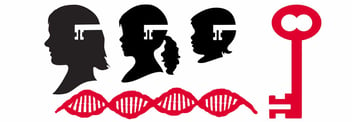What is the BDNF Gene?
- Home
- Blog

Reader, what is it about getting closer to nature that offers us so much solace? In hard times, the great outdoors can help clear our minds and give us a sense of hope. In good times, being outdoors can underscore just how lucky we are to be alive. Nature is a gift… but I can’t help but wonder how and why we are so drawn to it in times of high emotion. Why does it call to us as it does?
I believe that natural surroundings remind us, unconsciously or otherwise, of life’s potential. They are great symbols of the circle of life, the cycle of rebirth and renewal, of the abundance and flourishing that can arise from even the worst of circumstances. Unhealthy natural surroundings, however, can be viscerally painful to witness. Trees burned to a crisp, parched riverbeds, and more can lead us to question whether life can still survive under such circumstances.
As it happens, the bounty of nature–and its opposite–has a direct analogue in our own brains. You see, when our brains are flourishing, our neurons and synapses are as abundant and interconnected as the lushest jungle. But when they’re not, they’re as dried out as one of those drought-stricken river beds–and this can lead to numerous mental health consequences.
One gene in particular is responsible for determining whether your brain and its connections will flourish or falter–and that’s your BDNF gene. Let’s take a look at what this gene does and why it matters to your mental health.
Your BDNF Gene, Explained
BDNF, or Brain Derived Neurotrophic Factor, is a gene responsible for creating a protein of the same name, which in turn promotes survival and growth of your brain cells. It supports healthy cognitive functioning, produces critical neurotransmitters, and improves executive functioning. In other words, you might think of BDNF as your brain’s “fertilizer gene:” it’s the gene that keeps your brain healthy, abundant, and functioning, like a beautiful rain forest or jungle.
But the gene itself is only part of the story. You see, there are different variants of the BDNF gene, and depending on which variant you have, this gene may produce healthy levels of the BDNF protein your brain needs to flourish, or it may produce lower levels, making it harder for your brain to make connections and maintain healthy functioning.
A genetic test can help you determine which genetic variant you possess, and how it may be impacting your health. Higher levels of BDNF are instrumental to healthy mood regulation and cognitive functioning. If you have a genetic predisposition for lower levels of BDNF, you may suffer from cognitive or emotional problems, from anxiety and depression to cognitive dysfunction and brain fog. Luckily, if you have lower levels of BDNF, there are many interventions you can implement to increase levels of this important protein in your brain.
What Should I Do If I Have Lower Levels of BDNF?
Many lifestyle choices have been shown to positively impact BDNF levels in the brain. Exercise, for instance, has been proven to promote the greater expression of this gene, boosting BDNF levels and multiplying the potential for new and vibrant neuronal connections. Following a ketogenic diet has also been shown to help, as have certain medications, including ultra-low-dose lithium. In fact, in towns and cities with higher levels of lithium in the drinking water, they experience lower levels of violence and suicide.
BDNF is a foundational gene, fertilizing the roots of a grand brain cell ecosystem not dissimilar to a thriving garden or forest, where life can be sustained and grow freely. It is our choice to decide whether we want to foster this gene and grow an abundant “mental health root system” – and genetic testing can help us make a well-informed decision. To learn more about genetic testing or how we can help you thrive, contact us today.
.png?width=144&height=144&name=Untitled%20design%20(34).png)



